Overview
In the demanding world of healthcare, providers often face emotional challenges that can weigh heavily on their ability to deliver quality care. Administrative burdens can detract from the precious time they have with patients, leading to increased stress and decreased job satisfaction. This is where optimizing ambient notes becomes crucial.
AI technologies, such as those provided by CosmaNeura and DeepScribe, offer promising solutions to streamline documentation processes. By reducing the time spent on paperwork, these tools allow healthcare professionals to focus more on what truly matters—their patients. Imagine the difference it could make when providers can dedicate more time to patient care, ultimately enhancing clinical outcomes and fostering a more fulfilling work environment.
Consider how much more rewarding your day could be if you could spend less time on administrative tasks. With the right support, you can reclaim that time and improve both your well-being and the care you provide. Let’s explore how these innovations can transform your practice and help you connect more deeply with your patients.
As you reflect on your daily challenges, remember that you are not alone. Embracing AI solutions could be the first step towards a more balanced and satisfying healthcare experience. Together, we can work towards a future where technology supports your vital role in patient care.
Introduction
In the rapidly evolving landscape of healthcare, many providers are feeling the weight of administrative burdens. This can lead to emotional exhaustion, impacting not only their well-being but also the quality of patient care. As we explore the integration of ambient AI technologies, it’s important to recognize how these innovative solutions can alleviate some of these challenges.
By automating tedious administrative tasks, ambient AI is enhancing the efficiency of healthcare providers while fostering a more patient-centered care model. Imagine a world where clinicians can focus more on their patients rather than paperwork. Tools like CosmaNeura, DeepScribe, and Suki.ai are shining examples of how AI can streamline workflows and enrich patient interactions.
As organizations strive to alleviate clinician burnout and improve documentation accuracy, the emergence of these tools showcases the potential of AI in reshaping healthcare documentation practices. This article delves into the latest advancements in ambient AI, exploring how they adhere to ethical standards and enhance overall patient care. Together, we can navigate this transformative journey towards a more compassionate healthcare system.
CosmaNeura: Streamlining Healthcare Documentation with Intelligent AI Solutions
In today’s fast-paced healthcare environment, providers often face overwhelming administrative burdens that can detract from their primary focus: patient care. CosmaNeura understands these challenges and utilizes to automate administrative tasks, significantly enhancing healthcare record efficiency. By autonomously managing client intake, appointment organization, medical record administration, and billing, the platform allows healthcare professionals to dedicate more time to what truly matters—the well-being of their patients.
This shift not only elevates the quality of clinical interactions but also ensures that documentation practices align with Catholic teachings, reinforcing ethical medical standards. Imagine the relief of knowing that your administrative duties are handled efficiently, enabling you to provide compassionate care. Real-world applications of AI in automating these tasks are already showing promising results, with many medical service providers reporting significant time savings and increased accuracy in documentation.
For instance, those using AI-powered platforms indicate recovering several hours each day, time that can be redirected toward enhancing service delivery. This aligns with the public's hope for AI advancements in healthcare, as most Americans trust that AI will lead to significant improvements, particularly in diagnostics and accessibility.
A Healthcare Development Specialist shared, 'By continually observing the sector, we frequently provide the most recent insights to prospects, clients, and readers, assisting them in making informed choices and integrating their services with the expertise to utilize AI efficiently and responsibly.' CosmaNeura leads this initiative, ensuring that its AI solutions not only enhance efficiency in records but also adhere to the ethical principles of Catholic teachings. This commitment promotes a compassionate approach to care that resonates deeply with both providers and patients alike.
Consider the potential impact of embracing AI solutions in your practice. Are you ready to transform your administrative processes and focus more on what you love about healthcare? Let’s work together to make this vision a reality, fostering a more compassionate and effective healthcare environment.
DeepScribe: Enhancing Clinical Documentation with Real-Time AI Assistance
Healthcare providers often face overwhelming emotional challenges, particularly due to administrative burdens that detract from patient care. DeepScribe utilizes the capabilities of ambient notes AI to transform interactions into organized clinical records instantly. This innovative technology not only streamlines the documentation process but also significantly improves the accuracy of clinical notes by incorporating ambient notes. By allowing clinicians to concentrate more on client engagement during consultations, DeepScribe effectively reduces the time spent on administrative tasks. This reduction is essential in tackling the pressures that lead to clinician burnout.
Research shows that excessive administrative workloads are closely associated with burnout, making it crucial for the medical sector to alleviate these pressures to achieve its service objectives. By improving record-keeping methods, DeepScribe aids in superior medical service and , ultimately promoting greater job satisfaction among medical professionals. As the industry shifts towards patient-centered care, the role of real-time AI assistance in alleviating clinician burnout becomes increasingly vital. This change in emphasis improves involvement and contentment, illustrating the significant effect that efficient documentation can have on clinical practices and overall medical service delivery.
Furthermore, by integrating AI-driven solutions, medical providers can enhance workflow efficiency, streamline communication, and improve patient-physician interactions. To further optimize the use of ambient AI, medical providers should consider progressing through three phases of growth:
- Developing: Begin by understanding the specific needs of your practice.
- Improving: Implement AI tools that directly address those needs.
- Sustaining: Continuously evaluate and adapt to ensure ongoing benefits.
By ensuring that they fully leverage the benefits of AI tools in their practices, healthcare providers can create a more supportive environment for themselves and their patients. Together, we can make strides towards a healthier work-life balance in the medical field.
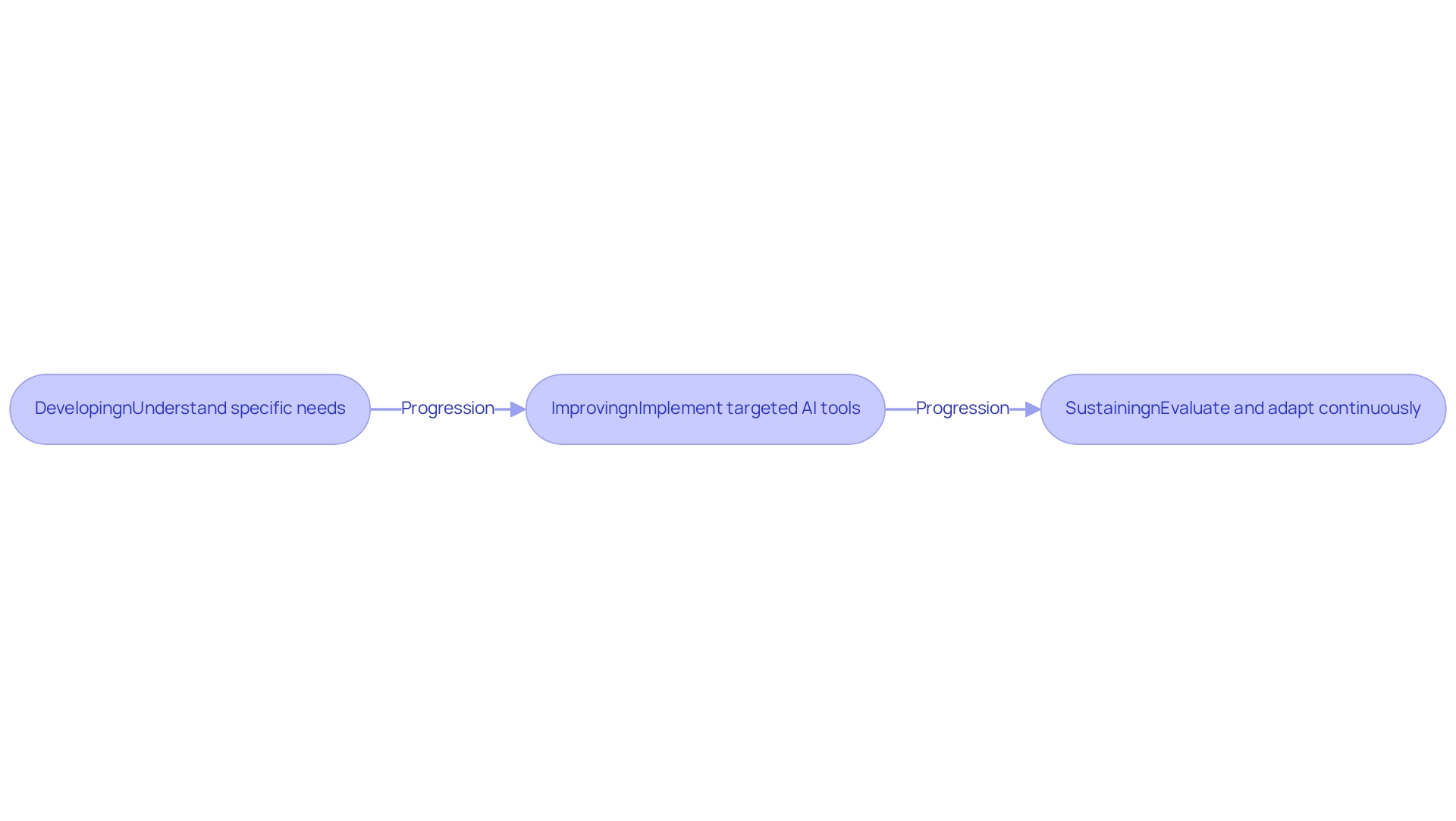
Ambience Healthcare: A Comprehensive Ambient AI Platform for Diverse Medical Specialties
CosmaNeura introduces a compassionate ambient AI platform designed to address the diverse needs of medical specialties. By automating and simplifying record-keeping processes, this platform allows medical providers to focus on what truly matters—delivering exceptional care to individuals. Its seamless integration with existing workflows helps clinicians maintain their attention on client interactions, significantly enhancing both documentation accuracy and efficiency.
Have you ever felt overwhelmed by administrative tasks? Recent statistics reveal that 10% of physicians embraced AI for patient-facing health recommendations and self-care engagement in 2024, up from 8% in 2023. This trend underscores the growing reliance on AI technologies in healthcare, particularly platforms like CosmaNeura that enhance administrative efficiency and support providers in their clinical roles. A case study on CosmaNeura shows that automating these tasks not only boosts job satisfaction among providers but also fosters revenue growth through optimized billing practices, all while adhering to ethical medical standards aligned with Catholic teachings. The features of the CosmaNeura ambient notes AI platform cater to a wide range of medical fields, ensuring that each provider can harness its capabilities to elevate the quality of service. By addressing the shared concerns of medical practitioners about AI's impact on client interactions, CosmaNeura nurtures an environment where innovation is embraced rather than resisted. This is particularly important, as medical startups often face significant hurdles in overcoming physicians' inherent reluctance to change, stemming from understandable fears about how alterations might affect treatment.
As the healthcare landscape evolves, the importance of efficient record-keeping becomes increasingly evident, allowing more time for client interaction and less for administrative duties. This shift is crucial in fostering an environment where quality assistance is prioritized, ultimately benefiting both providers and individuals alike. As highlighted by The Permanente Medical Group, 'For our larger, regional pilot evaluation, we concentrated on data from the first 10 weeks after the introduction of between October 16 and December 24, 2023,' showcasing the real advantages of AI in enhancing documentation within the medical field.
Suki.ai: Advanced EHR Integration for Hassle-Free Documentation
Healthcare providers often face overwhelming administrative tasks that can detract from their primary mission: patient care. Suki.ai offers a compassionate solution, seamlessly integrating with Electronic Health Record (EHR) systems to empower clinicians in documenting encounters with remarkable ease. By utilizing voice commands and AI-driven insights, Suki.ai significantly reduces the time spent on administrative duties, allowing providers to focus more on their patients' needs.
Imagine the relief of clinicians who can navigate the complexities of coding requirements with greater accuracy and efficiency. Studies reveal that EHR implementation can cut down the time needed to access individual information by up to 80%. This highlights the transformative potential of such technologies, paving the way for a more patient-centric approach in healthcare.
As the medical field evolves, tools like Suki.ai play a pivotal role in enhancing communication and personalized care, ultimately improving overall service delivery. Based on a case study regarding , the sector is moving towards solutions that offer secure access to patient information and tailored health recommendations, perfectly aligning with Suki.ai's capabilities.
Furthermore, Joe Tuan notes, "By utilizing AI tools created for compliance, automation, and cybersecurity, medical organizations can safeguard sensitive information and uphold trust in their systems." This observation underscores the broader implications of AI integration in medical documentation, reinforcing the significance of Suki.ai in the context of ambient notes and clinical intelligence.
Are you ready to embrace a solution that not only enhances efficiency but also nurtures the clinician-patient relationship? Suki.ai stands ready to support healthcare providers in their journey toward delivering exceptional care.
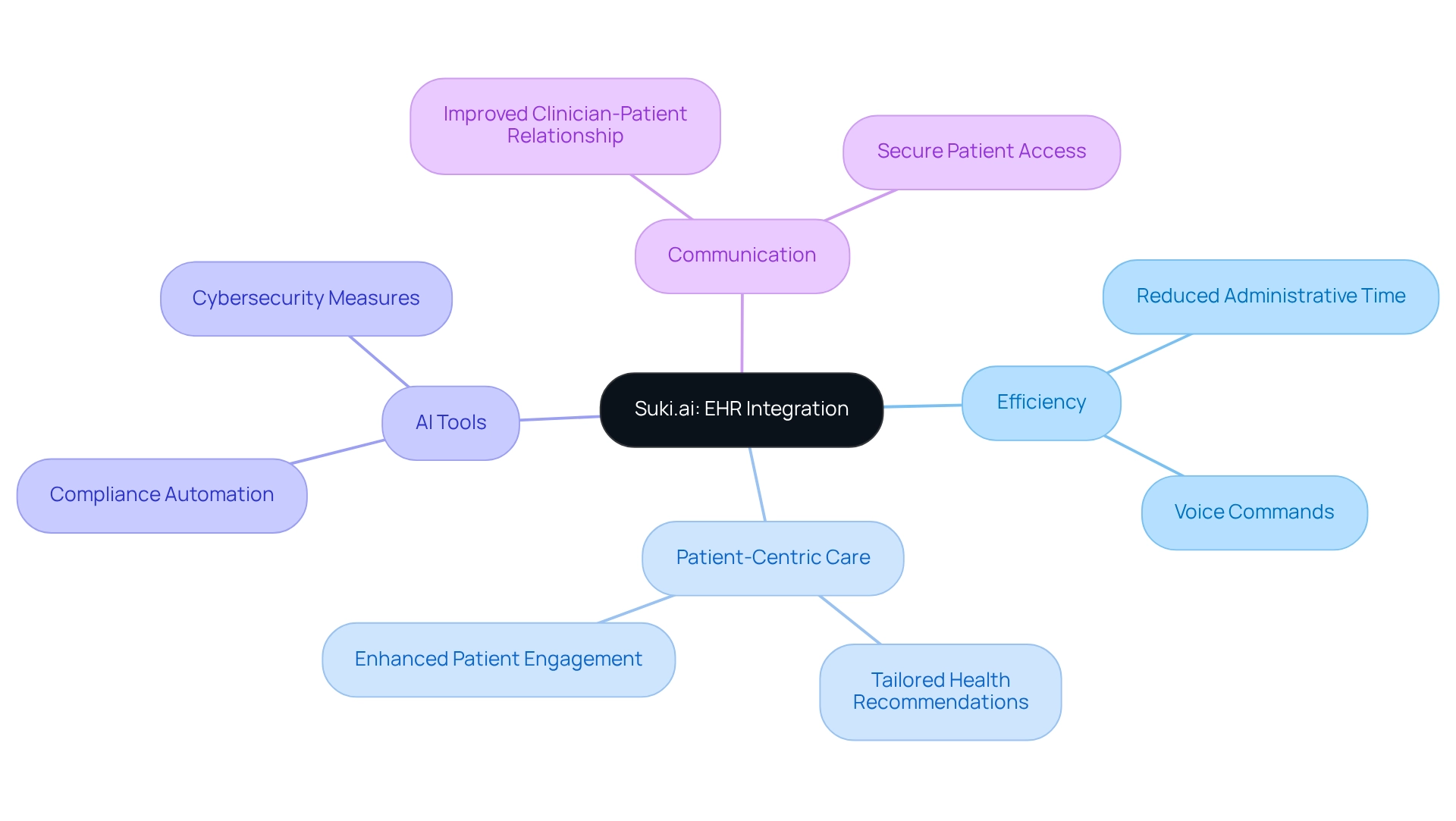
NEJM Catalyst: The Role of Clinician Training in Successful Ambient AI Implementation
is essential for the successful integration of ambient notes AI technologies in medical environments. Have you ever felt overwhelmed by the rapid pace of innovation? According to NEJM Catalyst, training programs must emphasize best practices for utilizing AI tools. This ensures that clinicians feel confident and skilled in employing these innovations to enhance patient support.
Statistics from a survey conducted between June 10 and June 19, 2023, reveal that 78% of clinicians reported increased engagement and effectiveness when participating in well-structured training initiatives. Comprehensive training not only enhances proficiency but also addresses potential resistance to change. This fosters a culture of acceptance and adaptability within medical organizations.
As Matheny et al. state, "Data science curricula should encompass how to form multidisciplinary development teams to improve the value of AI and to be aware of the ethics, equity, diversity, and inclusion principles at play and the inadvertent ramifications that may result from AI implementation." Furthermore, consider the case study on Amazon's AI impact on fulfillment centers. It demonstrates that effective training initiatives can lead to a 75% increase in employee engagement and a 40% improvement in task fulfillment time.
By prioritizing clinician education, healthcare providers can fully leverage the advantages of ambient notes in AI. This transformation can enhance workflows and improve the quality of care delivered. Let us embrace this opportunity for growth and support each other in navigating these changes.
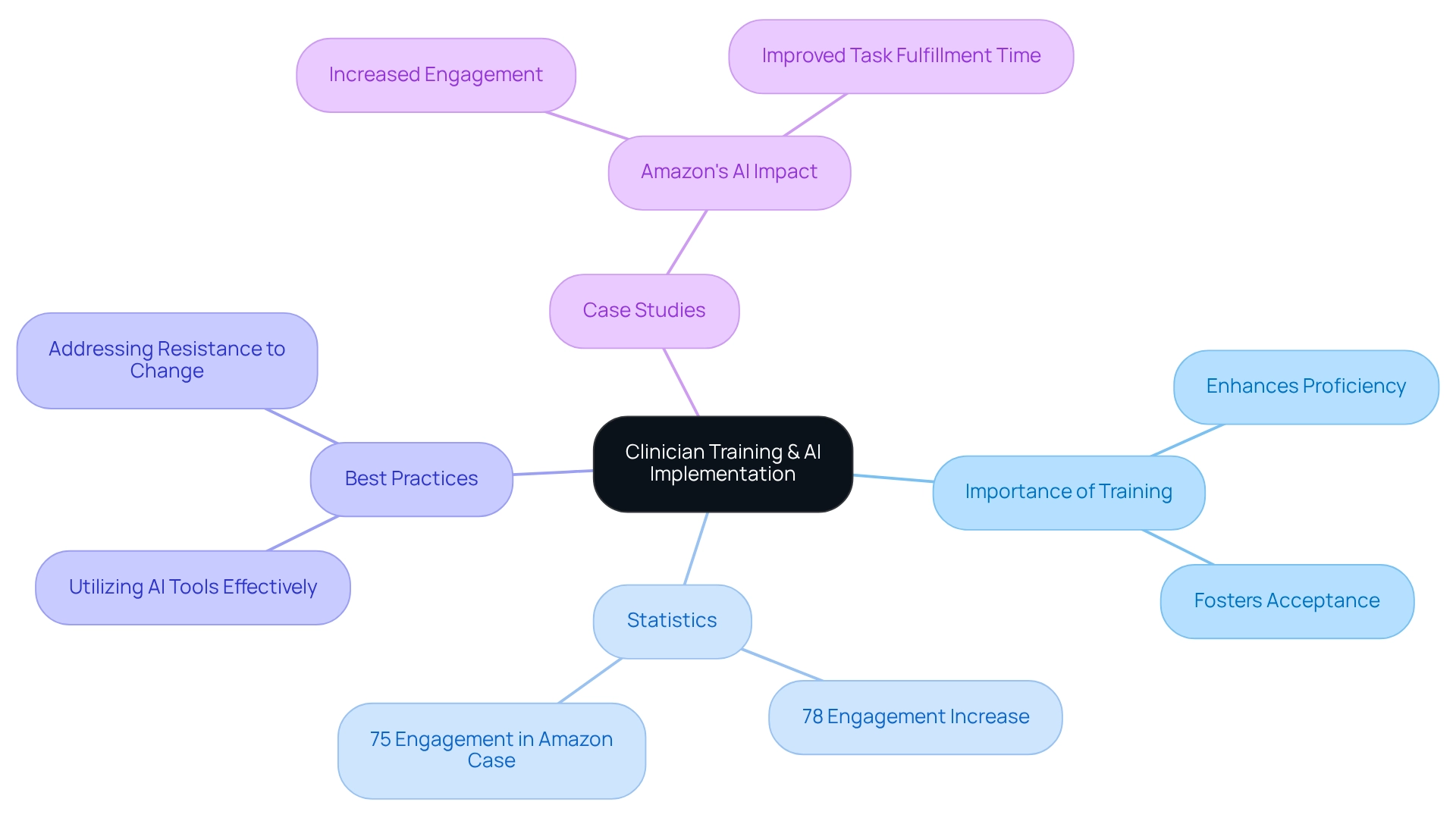
Stanford Medicine: Utilizing Ambient AI for Effective Clinical Note-Taking
Healthcare providers often face emotional challenges that can hinder their ability to deliver the best care. The administrative burdens they encounter can be overwhelming, detracting from their focus on patients. Stanford Medicine has effectively integrated ambient notes AI into its clinical workflows, leading to remarkable improvements in note-taking efficiency. By utilizing AI to record and transcribe interactions in real-time, clinicians can devote their attention to their clients, rather than feeling bogged down by documentation tasks. This innovative approach not only enhances the quality of clinical notes but also integrates ambient notes to cultivate a more engaging and human-centered patient experience.
However, medical startups frequently encounter considerable obstacles in overcoming resistance to innovation. Many providers are understandably cautious about preserving quality services. Yet, studies indicate that AI can act as a universal translator, accommodating varying education levels and languages, thereby enriching clinician-patient communication. The successful implementation of ambient notes in AI at Stanford Medicine serves as a compelling case study, demonstrating how technology can streamline administrative processes while fostering .
Similarly, CosmaNeura's Agentic AI platform illustrates how AI can revolutionize medical service delivery for primary providers, particularly those aligned with Christian values. By automating administrative tasks, CosmaNeura allows clinicians to concentrate on healthcare while adhering to ethical practices grounded in Catholic teachings. As Christian Lindmark, Vice President and Chief Technology Officer, emphasizes, "Make sure you have good strategic partnerships. Whether it's companies like Nordic or AWS, rely on your partners and build strategic relationships that can help you achieve your goals." This highlights the importance of teamwork in deploying AI solutions, showcasing the themes of overcoming innovation resistance in medical settings and improving service delivery through streamlined administrative efficiency.
To effectively tackle these challenges, medical startups should focus on establishing robust partnerships and showcasing the concrete advantages of AI in enhancing outcomes for individuals. Consider the following key solutions:
- Build strong strategic partnerships.
- Highlight the benefits of AI in reducing administrative burdens.
- Foster an understanding of how technology can enhance patient care.
By embracing these strategies, healthcare providers can navigate the complexities of innovation with confidence and compassion.
Rural Health: Transforming Hospital Medicine with Ambient AI Solutions
In rural regions, healthcare providers face significant emotional challenges, often feeling overwhelmed by administrative burdens that detract from their ability to deliver compassionate care. Ambient notes in AI solutions are emerging as a beacon of hope, as they transform hospital medicine by simplifying documentation procedures and improving access to essential services. CosmaNeura's innovative platform automates clinical note-taking, reducing the administrative load on medical professionals and allowing them to focus on providing high-quality support to individuals. This change is particularly crucial in areas where medical resources are frequently scarce, and the need for effective care provision is critical.
However, the medical field often shows reluctance to new ideas. Many physicians worry about preserving the standard of care and maintaining meaningful interactions with individuals. This risk aversion can hinder the adoption of new technologies. CosmaNeura's AI solutions directly address these concerns by enabling real-time record-keeping, which decreases the time spent on administrative tasks and lessens the risk of burnout among providers. How can we support our healthcare heroes in overcoming these hurdles?
Statistics reveal a staggering 57% increase in the volume of to providers since the onset of the COVID pandemic, exacerbating the challenges faced by rural medical professionals. Expert insights suggest that ambient notes from listening technology can significantly enhance provider well-being by allowing for the seamless incorporation of clinical records into patient interactions. This capability is essential in rural medical services, where providers often juggle multiple responsibilities and face unique challenges in maintaining efficient workflows. As highlighted by the Stanford PFI, this technology can significantly lessen provider burnout, aligning with CosmaNeura's mission to improve the work experience of healthcare professionals, while case studies demonstrate the effectiveness of CosmaNeura's ambient notes AI in transforming rural healthcare records.
Hospitals that have adopted these solutions report improved accuracy in clinical records and enhanced communication among treatment teams, reflecting the company's commitment to ethical practices rooted in Catholic teachings. For instance, one case analysis emphasized a rural medical facility that decreased record-keeping time by 30%, enabling providers to concentrate more on healthcare. Real-world examples underscore how CosmaNeura's AI technologies are enhancing access to care in rural hospitals, ensuring that individuals receive timely and effective treatment.
As the landscape of medical services continues to evolve, CosmaNeura's ambient notes AI solutions are poised to play a crucial role in addressing the current challenges in rural medical records processes. This innovative approach not only promises improved outcomes for individuals but also fosters more sustainable medical practices. Together, we can embrace these advancements to create a brighter future for healthcare in rural communities.
The Healthcare Blog: Exploring the Latest Trends in Ambient Scribing
The Healthcare Blog delves into the latest trends in ambient scribing, showcasing how ambient notes and AI technologies are reshaping clinical record-keeping. As healthcare providers increasingly embrace ambient notes AI solutions, we witness a significant shift towards improving client engagement and enhancing documentation accuracy. Recent findings reveal that while half of surveyed physicians have access to AI scribes, many are not utilizing them. This presents a vital opportunity for growth in this promising area.
AI tools, such as ambient listening, are designed to streamline workflows, allowing providers to focus more on patient care rather than administrative duties. This technology not only fosters compassionate and ethical interactions with individuals but also reclaims precious time for both providers and patients. For instance, a recent case study titled "Facilitators and Barriers to Adoption" highlighted that the speed and ease of editing AI-generated notes were key facilitators for adoption. However, it also pointed out that accessibility issues for individuals who do not speak English remain a barrier, potentially hindering the widespread adoption of these advancements.
Expert insights underscore the transformative potential of these technologies. One physician, who preferred to remain anonymous, noted that AI could help providers balance their professional and personal lives, reducing the trade-off between client engagement and personal time. As the medical landscape evolves, integrating technologies for ambient notes becomes essential for enhancing and improving patient outcomes. Addressing barriers to adoption, such as accessibility, will be crucial in ensuring that all medical providers can benefit from these innovations.
How can we ensure that these advancements reach everyone in the healthcare field? By acknowledging and addressing the common challenges faced by providers, we can foster a supportive environment that encourages the adoption of these life-changing technologies.
AHIMA Journal: The Growing Interest in Ambient AI for Clinical Documentation
The AHIMA Journal emphasizes a significant surge in interest surrounding ambient notes in AI for clinical documentation, reflecting the emotional challenges faced by healthcare providers. With increasing demands on medical organizations to prioritize efficiency and reduce clinician burnout, ambient AI technologies are emerging as vital tools to alleviate these burdens. This trend signifies a broader shift towards automation, allowing healthcare providers to focus more on delivering high-quality patient care.
A compelling case study titled '' reveals that the use of ambient AI scribe tools has led to notable enhancements in clinical efficiency. Users report a substantial reduction in time spent on record-keeping tasks, which is a common source of frustration. Average ratings for thoroughness, organization, and precision of records have impressively reached scores between 4.6 and 4.7, indicating a high level of satisfaction among users.
Experts in the field, such as Aaron A. Tierney, PhD, emphasize the importance of these technologies in addressing clinician burnout and enhancing job satisfaction. Furthermore, Brian Hoberman, MD, points out that effective implementation often hinges on usability tailored to specialty workflows. As medical startups navigate the challenges of introducing innovative solutions, the growing interest in ambient notes AI for clinical records signals a promising future for automated solutions that support both providers and patients.
In conclusion, these technologies hold the potential to alleviate clinician burnout and address the concerns of risk-averse physicians. How can we further engage with these advancements to improve our healthcare systems? The journey towards a more efficient and compassionate healthcare environment is underway, and embracing these tools can lead to a healthier future for both providers and patients.
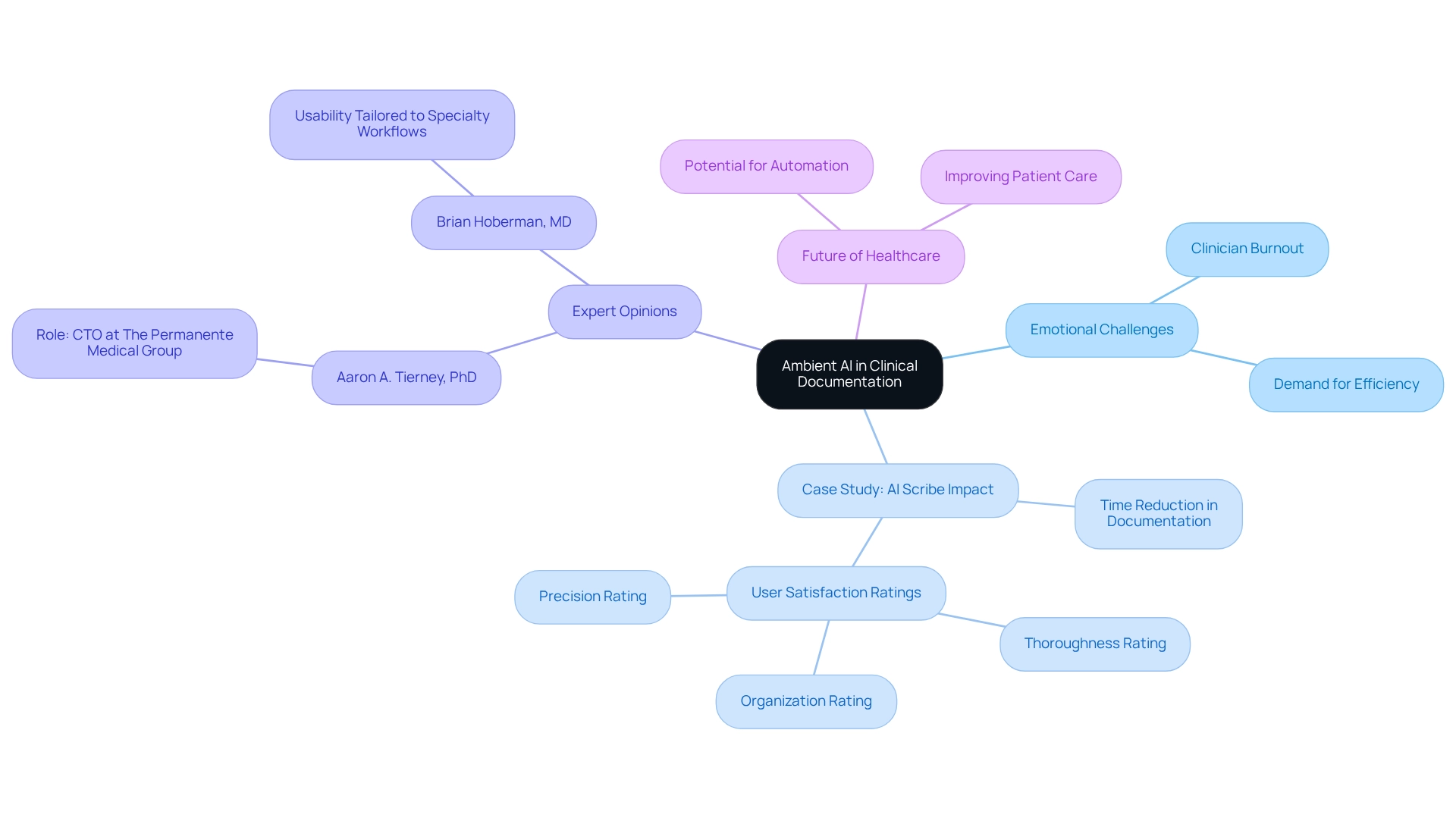
KLAS Spotlight Report: The Importance of Accurate Documentation and Coding in Healthcare
emphasizes the vital importance of precise record-keeping and coding in the medical field. Ambient notes produced by AI technologies are transforming the accuracy of clinical documentation, ensuring compliance with regulatory standards while also optimizing reimbursement processes. By integrating ambient AI into their workflows, healthcare providers can enhance record quality, reduce errors, and improve the financial health of their practices.
Consider the recent advancements in AI-enabled medical coding models. These innovations have demonstrated improved accuracy in code assignment and documentation, which directly influences revenue and compliance. According to industry statistics, these models have shown a significant increase in coding accuracy, leading to better reimbursement outcomes. Moreover, analytics can pinpoint critical moments for safety interventions, maximizing their effectiveness and contributing to improved outcomes for individuals.
A case study titled "Impact of Advanced Analytics on Patient Safety" illustrates the transformative effects of advanced analytics on patient safety. It shows that continued investment in these capabilities can result in better patient outcomes, shorter reporting times, and substantial cost savings. As the medical environment evolves, the implementation of ambient notes in AI not only simplifies administrative duties but also reinforces the ethical principles of support.
Think of it this way: "It's like constructing a house—without a solid foundation, everything collapses." This analogy highlights that precise documentation is essential for a robust medical system. This approach aligns with the compassionate spirit of Catholic healthcare, ensuring that care providers can focus on delivering ethical and effective patient care.
As we reflect on these advancements, how can we further embrace these technologies to alleviate the burdens faced by healthcare professionals? By fostering a supportive environment, we can ensure that every individual receives the care they deserve.
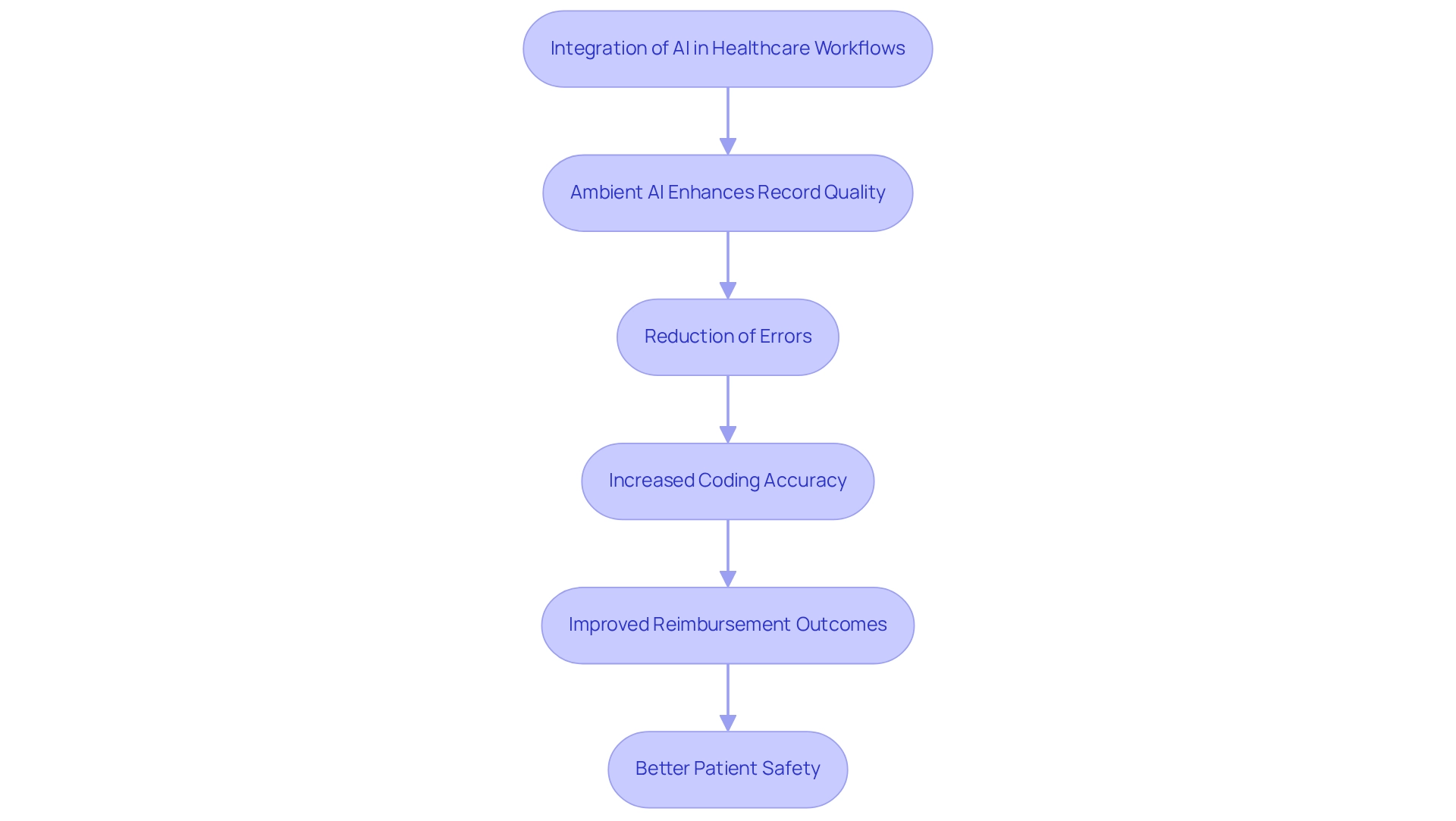
Conclusion
The integration of ambient AI technologies in healthcare is emerging as a transformative force, addressing the significant administrative burdens faced by providers. As we reflect on the challenges, tools like CosmaNeura, DeepScribe, and Suki.ai are streamlining documentation processes, allowing clinicians to shift their focus back to patient care instead of paperwork. This vital shift not only enhances the quality of clinical interactions but also fosters a more compassionate healthcare environment, ultimately benefiting both providers and patients alike.
By automating tedious tasks and improving documentation accuracy, ambient AI plays a crucial role in alleviating clinician burnout, a pervasive issue in our healthcare industry. As reliance on these technologies grows, healthcare organizations are recognizing the importance of effective training and support to ensure successful implementation. This commitment to education nurtures a culture of adaptability and acceptance, essential for harnessing the full potential of AI in enhancing patient outcomes.
As the healthcare landscape evolves, the promise of ambient AI solutions becomes increasingly evident. Evidence from various case studies and expert insights underscores the potential of these technologies to streamline workflows while upholding ethical standards in patient care. The journey toward a more efficient and patient-centered healthcare system is underway, and embracing ambient AI is a crucial step in that direction. By prioritizing innovation and collaboration, we can navigate the complexities of modern care delivery while remaining steadfast in our commitment to compassionate, high-quality service.
How can we further engage with these advancements? Let us continue to explore and support each other in this transformative journey.




